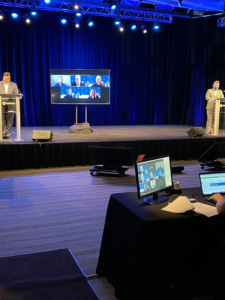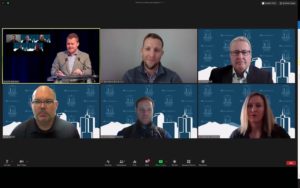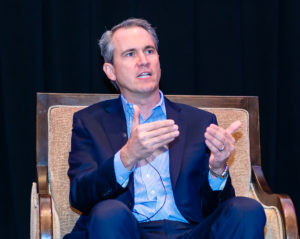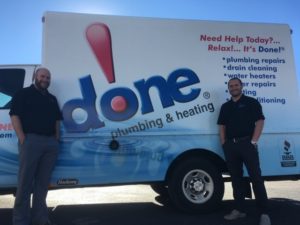 Lance Enders, the Denver Metro Chamber’s vice president of membership, has in a way grown up alongside the Denver metro region. Nearly 27 years ago shortly after starting at the Chamber, he attended the grand opening of Denver International Airport.
Lance Enders, the Denver Metro Chamber’s vice president of membership, has in a way grown up alongside the Denver metro region. Nearly 27 years ago shortly after starting at the Chamber, he attended the grand opening of Denver International Airport.
“I remember thinking how amazing it was to work for an organization that had such a big role in making sure the airport happened,” he said.
Now, as he enters retirement this spring, he looks back with pride on all the Chamber has accomplished during his tenure.
“From Denver International Airport to the Convention Center and Mile High Stadium, I feel proud to look back and see that I raised money that helped shape this city,” he said.
Enders has played an important part in creating the culture that makes the Chamber a great place to work and building a cohesive sales and membership team that has consistently met their budget goals and increased Chamber membership.
“Lance has made a huge impact on the Chamber,” said Robert Kross, senior membership representative. “He took a chance on me and was the one who became a mentor and a leader for myself and was really able to guide me on a professional and personal level.”
Kross, along with Kathryn Williams and Carlos Garcia, were on Enders’ team over the last year during the pandemic, a challenging time for the business community and one where the Membership staff were even more instrumental in supporting our members.
“Thank you for supporting me through challenging times, your guidance, wisdom and for believing in me,” said Williams in a tribute to Enders. “I’ll never forget your contagious laugh, as it echoed down the hallway at the office, and how you listened intently when I came to you with issues and questions.”
During his tenure, the Chamber expanded the companies that became members, representing companies large and small that make up Denver’s diverse business community. One of Enders’ key responsibilities was cultivating relationships with these companies and demonstrating the value in a Chamber membership, something he did exceptionally well.
“I had been a member of the Chamber for almost 20 years at the time Lance joined the Chamber staff,” said Ned Minor, former Denver Metro Chamber of Commerce board chair. “Over these past 27 years Lance and I worked seamlessly together to recruit new members. Lance was perhaps at his best during tough economic times when retention was essential. Lance never disappointed me. Lance always made me feel appreciated and treated me as if I was the Chamber’s most important member. Perhaps this is part of his true legacy, his selfless gift of making everyone else feel like they are number one.”
Chamber President and CEO Kelly Brough started at the Chamber 11 years ago and said Enders has always had an unparalleled commitment to the organization and its members.
“Lance has touched so many lives in so many meaningful ways – not just through his work and passion for the Chamber but through his focus on building relationships with everybody he worked with,” Brough said. “His service to this organization and its 3,000 members was stellar. There wasn’t a single day he didn’t come in with a sincere commitment to our members.”
A life-long sports fan, Enders looks forward to relaxing, exercising and continuing to cheer on the Denver Broncos in his retirement. The culture of the Chamber has been forever shaped by Enders’ contributions. His commitment to Chamber members has cemented his legacy in the Chamber’s 153-year history.
Thank you, Lance!
SEE HOW OUR MEMBERS HAVE BEEN
virtually connecting and look to see where you can
engage at denverchamber.org/calendar.
NATIONAL EXPERTS OFFER INSIGHTS & ADVICE DURING EDC’S FIRST VIRTUAL SITE SELECTION CONFERENCE
 In September, the Metro Denver EDC hosted its annual Site Selection Conference – a series of conversations with national consultants who are hired by America’s Fortune 1000 companies to scout communities on their behalf. Site selectors joined the EDC to tour the Metro Denver region, meet with economic development partners and investor companies, get a broad overview of the business environment and regional assets, and
In September, the Metro Denver EDC hosted its annual Site Selection Conference – a series of conversations with national consultants who are hired by America’s Fortune 1000 companies to scout communities on their behalf. Site selectors joined the EDC to tour the Metro Denver region, meet with economic development partners and investor companies, get a broad overview of the business environment and regional assets, and
they offered insights and feedback as to how we, as a community, can best position Metro Denver relative to the needs of prospective companies.
 This year’s virtual discussions focused on the pandemic’s impact on economic development, new strategies for recruiting and retaining companies, job creation and our region’s position on expansion and relocation relative to the nation’s top metropolitan areas. One theme consistently rose to the top of our conversations – talent. A focus on people is paramount to helping their clients either choose Colorado – or another state for relocation and expansion. Check out the recap video for 10 key takeaways of the panel.
This year’s virtual discussions focused on the pandemic’s impact on economic development, new strategies for recruiting and retaining companies, job creation and our region’s position on expansion and relocation relative to the nation’s top metropolitan areas. One theme consistently rose to the top of our conversations – talent. A focus on people is paramount to helping their clients either choose Colorado – or another state for relocation and expansion. Check out the recap video for 10 key takeaways of the panel.
COMMUNITY CONVERSATIONS ON ISSUES OUR COMMUNITY IS FACING AT THE LEADERSHIP FOUNDATION’S VIRTUAL VOICES
 Our Denver Metro Chamber Leadership Foundation’s Virtual Voices aims to keep alums informed and engaged as our community works through this challenging time. Each virtual meeting brings together leaders on the front lines of impacted industries to share their knowledge, perspectives and leadership lessons. Alumni have convened to talk about mental health, how to talk to their kids about race, creating an inclusive workplace, the power of storytelling and more! Join the upcoming Virtual Voices on Technology Today on Nov. 12.
Our Denver Metro Chamber Leadership Foundation’s Virtual Voices aims to keep alums informed and engaged as our community works through this challenging time. Each virtual meeting brings together leaders on the front lines of impacted industries to share their knowledge, perspectives and leadership lessons. Alumni have convened to talk about mental health, how to talk to their kids about race, creating an inclusive workplace, the power of storytelling and more! Join the upcoming Virtual Voices on Technology Today on Nov. 12.
WELCOMING NEW IMPACT DENVER AND LEADERSHIP DENVER CLASSES
This past September our Denver Metro Chamber Leadership Foundation virtually kicked off the Impact Denver fall 2020 class and Leadership Denver 2021 class. Throughout their program experience leaders will dive deep into issues facing our community, work on group projects, connect with civic leaders and grow their network. We’re excited to see what these leaders will accomplish.
Interested in taking the next step in your leadership journey? Check out the Leadership Foundation’s programs to see which program is right for you.
Applications are open for Access Denver, Colorado’s’ Civic DNA Fellows and Impact Denver spring 2021 class .
CONNECTING BUSINESS AND POLICY AT COLORADO COMPETITIVE COUNCIL’S (C3) BUSINESS BASECAMPS
 This year C3’s Business Basecamp had to adapt due to COVID-19, and it was able to continue forward in a safe, responsible and fun way. Over four basecamps, participants were hosted by Representative Perry Will (R-57) and Representative Julie McCluskie’s (D-61), Representative Mark Baisley (R-39) and Senator Tammy Story’s (D-16), Matt Soper (R-54) and Representative Janice Rich’s (R-55), and Representatives Yadira Caraveo (D-31) and Kyle Mullica’s districts (D-34). They were able to learn about local districts — from local business at the top of Breckenridge Mountain to touring the housing development Sterling Ranch to visiting a working cattle farm and riding RTD’s newly opened N Line.
This year C3’s Business Basecamp had to adapt due to COVID-19, and it was able to continue forward in a safe, responsible and fun way. Over four basecamps, participants were hosted by Representative Perry Will (R-57) and Representative Julie McCluskie’s (D-61), Representative Mark Baisley (R-39) and Senator Tammy Story’s (D-16), Matt Soper (R-54) and Representative Janice Rich’s (R-55), and Representatives Yadira Caraveo (D-31) and Kyle Mullica’s districts (D-34). They were able to learn about local districts — from local business at the top of Breckenridge Mountain to touring the housing development Sterling Ranch to visiting a working cattle farm and riding RTD’s newly opened N Line.
FOOD AND BEVERAGE COMPANIES WERE ON THE MENU AT DENVER STARTUP WEEK
 Trout Tank CPG Pitch Event highlighted consumer packaged goods (CPG food) and beverage entrepreneurs and businesses in Colorado, giving them opportunities to sharpen their pitching skills, gain exposure, secure funding, and build connections with lenders, investors, decision-makers and key stakeholders within the Colorado business and investing community.
Trout Tank CPG Pitch Event highlighted consumer packaged goods (CPG food) and beverage entrepreneurs and businesses in Colorado, giving them opportunities to sharpen their pitching skills, gain exposure, secure funding, and build connections with lenders, investors, decision-makers and key stakeholders within the Colorado business and investing community.
During Denver Startup Week, four companies showed off their innovations in the CPG food and beverage space. Sweet Logic, Patterbar, Green Belly Foods and Mad Lemon competed for a prize pack worth over $3,000 with Sweet Logic taking the final prize.
Applications are currently open for Trout Tank H2O. All businesses with a focus on water, new or old, can participate in order to sharpen pitching skills, gain connections with expert mentors and get awesome exposure opportunities, along with a $5,000 cash prize!
A PEW RESEARCH STUDY REPORTS MORE than half of Americans find the internet to be essential during the COVID-19 outbreak. This finding is not surprising to many people who are reading this magazine; as business leaders and parents who are working and managing learning from home, we know a home internet connection is needed now more than ever. Just pause for a moment and imagine life without internet at home.
While COVID-19 and the related stay-at-home orders put a spotlight on how critical it is to have access to technology and a reliable, high-speed home internet connection, the crisis also exposed even further the cruel irony of the digital divide. Those with home internet connections benefit from all the opportunities of a digital world, but those without fall even further behind.
Some of our most vulnerable populations include low-income and refugee families who suddenly have to adapt to online learning and figuring out how to work from home or search for work virtually for the first time, and seniors who need to stay connected as they isolate away from loved ones can particularly benefit from home connectivity.
How can we come together as civic leaders to address this need to better serve our community? Here are some ways we can work together to ensure greater digital equity and inclusion.
Comprehensive Approach To Digital Inclusion
In order to address the digital divide, we need to think of the issue as more than just a physical home internet connection. There are multiple barriers to connectivity that come into play and make up the reasons why an individual or a family may not have a home internet connection.
Some people lack the digital literacy to understand the benefits a home internet connection can provide. They may not fully realize the equalizing power the internet can provide to them and their family, enabling someone to obtain critical computing skills, search for jobs, access news and health care information and so much more.
Others may only have a smart phone or tablet at home and lack affordable hardware like a laptop or desktop computer. An internet connection is only as good as the device by which it is accessed.
And for others, the price of internet service may be the determining factor. Many people are balancing bills and are unaware of more affordable home internet options.
The good news is that there are numerous broadband companies and various internet offers available to low-income families throughout metro Denver. Comcast, for its part, has offered its Internet Essentials program for nearly a decade. The program is designed to be a wrap-around solution to directly confront every barrier to digital adoption by offering affordable internet at $9.95 per month, subsidized computers and free digital literacy training to eligible low-income families.
If we’re going to build digital equity in Colorado, we must address all three of these barriers and work together to educate our community on the importance of a home connection.
Public-Private Partnerships
As a leader in our community, I know you can appreciate the magnitude of this challenge, and that it’s one requiring all of us to work together to address.
At Comcast we’re constantly evolving our Internet Essentials program to better meet the needs of the community. In March, following the COVID-19 outbreak, we began offering Internet Essentials free for two months for new customers – an offer that will remain available through the end of the year.
We aligned and collaborated with a lot of help from elected officials, school districts and foundations and the nonprofit community to ensure we reached all families and individuals in our community.
We also partnered with nearly a dozen organizations to further cover the cost of home internet connectivity for Internet Essentials-eligible individuals and families who need additional financial assistance through our Internet Essentials Partner Program. The program, which relies on public-private partnerships, enables companies or nonprofits and other organizations to coordinate funding to help connect those who may still be unconnected.
Through creative solutions with local partners, together we’ve connected thousands of people to the power of the internet since March – many for the very first time.
We still have work to do to reach those who remain unconnected; and to ensure they gain the digital skills necessary to learn, work, and access health care and other vital services online.
School districts, foundations and nonprofit organizations cannot take on this massive task their own. And, we as business and community leaders can’t address it on our own. We all have a responsibility to re-imagine how we work together to help raise awareness about the need for connectivity, as well as ensure more people know about what programs and resources are available.
Everyone should have access to the opportunities made possible by having the internet at home. We hope as fellow civic leaders you join us in this work to build digital equity, as when our communities thrive, so do we.
In addition to welcoming Trey Rogers as the chair of the Denver Metro Chamber, its family of organizations – the Colorado Competitive Council, Denver Metro Chamber Leadership Foundation, Denver Metro Small Business Development Center and the Metro Denver Economic Development Corporation – all welcomed new board leadership. They’re part of our collective work to make Colorado a great place to live and do business. Get to know these incoming leaders.
Colorado Competitive Council Chair
Beverly Razon
Senior Vice President of Public Affairs COPIC
 After being engaged with C3 for more than 10 years, “I am excited and humbled at the opportunity to support [C3 Director] Lauren Masias in leading it forward,” Razon said.
After being engaged with C3 for more than 10 years, “I am excited and humbled at the opportunity to support [C3 Director] Lauren Masias in leading it forward,” Razon said.
And, Razon is ready to get to work: “This unprecedented time presents unprecedented opportunity for C3 to collaborate with, support and represent businesses across the state at the Capitol. This is critical to ensuring Colorado’s policies work to lift up the recovery of our economy in order to keep our citizens working or get them back to work. C3 is well-positioned to represent this statewide voice as we work through thoughtful, balanced policy with our elected leaders on the many issues we know are ahead of us.”
Denver Metro Chamber Leadership Foundation Board Chair
Anthony Graves
Principal, GRAVES CIVIC SOLUTIONS, LLC
 A longtime speaker at the Leadership Foundation’s Leadership Denver program days, Graves has engaged more deeply with the organization as a board member since 2015. A member of Mayor Michael B. Hancock’s cabinet for seven years, Graves recently launched a public affairs and economic development consultancy, and he’s seen an outpouring of support – something that makes doing business in Colorado special: “I love the focus on building long-term, authentic relationships and the personal interest that business leaders take in one another,” Graves said.
A longtime speaker at the Leadership Foundation’s Leadership Denver program days, Graves has engaged more deeply with the organization as a board member since 2015. A member of Mayor Michael B. Hancock’s cabinet for seven years, Graves recently launched a public affairs and economic development consultancy, and he’s seen an outpouring of support – something that makes doing business in Colorado special: “I love the focus on building long-term, authentic relationships and the personal interest that business leaders take in one another,” Graves said.
But with dual challenges of combatting coronavirus and racial injustice, Graves said the Leadership Foundation, which works to educate and inspire leaders to make a difference in the community, is critical: “This confluence of crises has underscored the importance of developing a pipeline of leaders in our society who can address the intractable challenges of today and prepare for the unknown challenges of tomorrow,” he said.
Denver Metro Small Business Development Center Board Chair
Rob Smith
Executive Director of Rocky Mountain MicroFinance Institute
 Smith returns as Denver Metro SBDC Chair, a role he’s held since 2018: “Ensuring small business has a voice at the table is incredibly important to me.”
Smith returns as Denver Metro SBDC Chair, a role he’s held since 2018: “Ensuring small business has a voice at the table is incredibly important to me.”
“Colorado has a ‘go for it’ spirit,” he said. “If we don’t know how to do it, we figure it out (and we do a really good job at it). There has been a lot of damage done as a result of COVID-19 and the waves of uncertainty and fear it brings, and we’ll see a fundamental re-orientation of our economy as a result. We’re an entrepreneurial state, through and through, and I’m excited to support our path forward through the incredible adaptability and resilience of our small business community.”
Metro Denver Economic Development Corporation Incoming Executive Committee Co-Chair
April Giles
Vice President of Business Development for the Fitzsimons Innovation Community
 Coloradans are up for any challenge, and that’s why Giles loves living and working here: “Time and time again when we call on our community to step up, lead, solve, inspire, mentor – you name it – Coloradans will join in to contribute,” she said.
Coloradans are up for any challenge, and that’s why Giles loves living and working here: “Time and time again when we call on our community to step up, lead, solve, inspire, mentor – you name it – Coloradans will join in to contribute,” she said.
And, Giles has seen that in action at the Metro Denver EDC. “Issues, such as workforce development, transportation, housing, arts and culture, are at the forefront of their work. Metro Denver EDC intuitively understands that by optimizing complementary economic development ‘systems’ we invest in long-term sustainable results,” she said.
And, she’s proud to serve an industry working on the frontlines to stop the pandemic: “They’ve rolled up their sleeves to serve. Colorado has a number of bioscience companies and hospital systems with high national regards for their work to provide diagnostic tests, leadership on vaccine clinical trials and their daily care of COVID-19 patients.”
Metro Denver Economic Development Corporation Incoming Board of Governors Co-Chair
Paul Washington
Market Director at JLL
 In the year ahead, Washington said he sees a unique opportunity “to brand the Denver region as a thought leader in how it will operate and compete in a post-COVID virtual economy.”
In the year ahead, Washington said he sees a unique opportunity “to brand the Denver region as a thought leader in how it will operate and compete in a post-COVID virtual economy.”
Washington first got to know the Metro Denver EDC as the executive director of Denver’s Office of Economic Development, where he saw how the Metro Denver EDC’s approach – of collaboration and coordination among the companies and municipalities from across the metro area – “distinguishes the Denver region from its competitors.”
And it’s that attitude – “the general culture that people are here to help and that we are in the process of really defining ourselves” – that Washington says makes Colorado a great place to live and work. “This allows for everyone to participate in the legacy of this state,” he said.
Your family likely has an emergency plan in place for severe weather. What about your business?
We've all heard the age-old saying: “Prepare for the worst, expect the best.” It seems like each year Colorado brings even more unpredictable weather, and with it dreaded network service outages that seem outside of our control. For Denver metro area business owners, losing access to their network would almost certainly hurt their bottom line.
I recently spoke with a customer who runs an IT services company. On a clear day in the heat of the summer, their area experienced a “brownout” – where less power is delivered to homes and buildings – due in part to high air conditioner usage, causing too much stress on the power grid. They were unable to make and receive sales calls for a full day, setting their business back an untold amount of dollars. Data show that businesses lose between $926 and $17,244 for every minute their operations are stalled. This could have been prevented.
Fortune favors the prepared. It’s clear that a business’s ability to remain operational during an outage could make or break their overall success. As you prepare your business for the worst, here are a few considerations for your checklist so that you can expect the best.
1) Make sure your network equipment is up to date. Often, businesses are so focused on their day-to-day success that they don’t stop to consider whether their internet is scaling with them. Equipment failure is a common cause of network outages and caused 40 percent of all reported downtime, according to a recent study. Think of your network equipment like a rubber-band – if you stretch it too wide, it’ll snap. Customers tend to forget that a state-of-the-art network requires equally cutting-edge equipment to physically support it.
2) Avoid network overload. If you’re a small business owner, your network may be only capable of handling a few employees online at a time. But what if a client comes into the office, or you experience a day with higher than normal traffic? In today’s connected era, it’s not uncommon for a single employee to have several connected devices on hand at any given moment. Double-check to make sure your network isn’t on the edge of its bandwidth.
3) Have a backup plan in place. Worst case scenario, the Metro Denver area experiences a power outage outside your control and your network goes down indefinitely. Cutting-edge tech has made it possible for your internet to stay on, even when your power goes out. Talk to your network provider about an automatic backup internet connection to ensure that your business keeps running smoothly, regardless of factors like weather, human error or severed power lines.
The bottom line is some aspects of network outages are within our control, but others are not. Running a business can be challenging and unpredictable, but in 2019 and as you look toward 2020, your internet access should be a sure thing. Plan ahead with your provider to make sure your network can support your business through even the heat of the summer or worst bomb cyclone – you’ll be glad you did.
Robert Thompson, is the vice president of Comcast Business, Mountain West Region
Businesses Finding Success – and Making a Big Impact
Small business continues to play a big role in Colorado’s economy, employing 1.1 million people and representing 99.5 percent of businesses. But, something bigger happens through these businesses, says Colorado Lending Source Executive Director Mike O’Donnell.
“I’m of the opinion that if you work for yourself or you create your own business you’ll be 100 percent engaged,” O’Donnell said, “and the small group of employees you build around you will more than likely be very actively engaged.”
What makes a business successful – transforms it from an idea to an actual product or service that makes a difference and builds a career for others? Four business owners share their stories – of start-up, of buying a business and of growing and securing the funding to match their customers’ needs.
Cooking up a new kind of fast-casual
Fetien Gebre-Michael’s business may be small, but she’s thinking big – and she wants to build the Chipotle of Ethiopian cuisine here in Colorado.

“I’m dreaming big,” she said.
With 11 siblings, Gebre-Michael only knows how to cook for large groups – something that came in handy when she started producing events. And what started as a side gig while she went back to school has become Konjo Catering and Events, which also boasts a food truck.
She wowed the judges at the Denver Metro Small Business Development Center’s Trout Tank: Food Frenzy with her Ethiopian cuisine and her vision for a fast-casual concept honoring her African heritage – an idea that she honed through Trout Tank and a loan readiness program, Scale Up.
Through Trout Tank she gained mentors from restauranteurs and concessionaires like Mission Yogurt, Maria Empanada, Punch Bowl Social and Larimer Associates, who she says still take time to talk through business challenges with her.
“It was about the connections I could make,” she said, adding that, “it was a confidence booster, too.”
And, immersing herself in several startup accelerators “really pushed me to say OK, you have to get your stuff together.”
Trout Tank also created an introduction to a lender – she is working to secure funding to open a stall in a food hall to test her concept: “I’m in a great position right now to get out there.”
Uncovering resources for starting up at the Chamber
As Mark Spiecker mulled over his next bioscience start-up with his business partners Joe Bagan and Jeff Hval, he was questioning whether he’d continue in Denver. It was where he’d started and scaled a series of companies, most recently Sharklet Technologies, but the Kansas City native considered returning home.

Then, while sitting in a Chamber board meeting, he heard from the head of the Metro Denver Economic Development Corporation – an affiliate of the Chamber – about the support they offer to businesses who are starting or growing, from finding a location and getting building permits to navigating tax incentives for creating jobs.
When he reached out to learn more, “the Metro Denver EDC deployed a team of people to make sure I knew that they wanted me to grow the business here,” Spiecker said.
And, they made it easy for him to focus on his business while they worked on those details. STAQ Pharma – a pharmaceutical manufacturing facility that will create ready-to-use doses of prescriptions for hospitals – is under construction in northeast Denver. It will be home to one of the largest clean rooms in the state and will incorporate robotic technology to avoid human error. They plan to add more than 70 new jobs, and through their work with the Metro Denver EDC they were approved for incentives – totaling nearly $1 million – when those jobs are added.
These resources, particularly as they started up, were invaluable, Spiecker said.
“Everybody should be reaching out … we were three guys with a business plan,” he said. “They gave us the same level of attention that any of the big companies would have gotten.”
Buying the family business
When Jeromy Metz’s family asked him to take over their business, Done Plumbing and Heating, he was apprehensive. More than 15 years later, he knows it was the best choice he could have made.

Instead of simply taking the reins, it was important to him to create a buyout plan for his parents.
“I insisted on buying the company,” Metz said. “I didn’t want to be handed the business.”
He looked at it like buying any other existing business and leaned on his longtime law firm, Minor & Brown, and his accountants to make it a smooth transition.
“We got outside experts involved a lot to help us and try to take as much emotion out of it as possible,” he said.
In buying an existing business, he had the benefit of an established reputation, customers and vendors.
“The benefit for me was I didn’t have to do any of that. That was set up by the time I bought it,” he said. “I didn’t have to have that initial ‘take a risk on me.’”
But, it gave him the opportunity to push the business forward. He transitioned their HVAC technicians to a four-day workweek – something that was uncommon when he made the shift but now is becoming an industry standard. He also recruited his younger brother, who owns a
minority stake in Done Plumbing and Heating, to add more technology to the toolboxes of their field team.
“I just continued down the path and made sure the company grew with the times,” Metz said.
Poising a business for growth in the outdoors
Kelly Watters and her husband Will met as ski instructors in Vail. But it was once they returned to city living, they realized that the outdoors really start at a person’s front door – and saw a gap in apparel that worked well in active settings like a hike or a bike but were versatile (and fashionable) enough to transition to dinner or travel.

With that, Western Rise was born four years ago. For this couple, the start-up community they needed was right here in the Rockies – this time in Telluride – as part of the Telluride Venture Accelerator.
Watters says they could grow 140 percent in 2019, and that as they scale they’re looking for funding that scales with them. Since they’ve started, they’ve explored nearly every avenue to access capital.
“We’ve done the full gamut of funding, from family and friends, to our own paychecks to loans from organizations like Colorado Lending Source and Kickstarter,” Watters said.
That Kickstarter campaign ended up being one of the most successful in the crowdfunder’s history: “It was an overwhelmingly big deal.”
With a recent round of nearly $1 million in funding, they will add four full-time employees and could potentially quadruple their sales by doubling their team.
“Our hearts have always been in the mountains and in Colorado,” Watters said. “One of the things we personally care about is growing it in a community like Telluride where we can offer stable jobs for young, educated individuals who want to stay and grow in these towns.”
Sara Crocker is the communications manager for the Denver Metro Chamber.
Major Projects Underway Benefit 1.4 Million People in the Denver Metro Area
Two big things are happening in suburban metro Denver that will have major impacts on the future of water quality for Denver Water customers.
Denver Water recently launched a $12 million upgrade to its Foothills Treatment Plant near Roxborough, and construction is underway on a $600 million North System Renewal Project, which includes a state-of-the-art treatment facility and a new water pipeline.
“These are critical projects for the 1.4 million people we serve,” said Nicole Poncelet-Johnson, director of water quality and treatment at Denver Water. “We’re investing in Foothills, our largest water treatment plant, and looking to the future by building the new Northwater plant.”
$12 million Foothills upgrade
Foothills opened in 1983 and is Denver Water’s largest water treatment plant. Foothills takes water gathered from mountain streams and treats it to meet drinking water standards. The plant can produce up to 280 million gallons of water per day.
“Treatment plants are like cars; they need tuneups to keep them running smoothly,” said David Swedensky, Foothills Treatment Plant manager at Denver Water.
The work at Foothills includes upgrading the plant’s electrical distribution systems, replacing 48 large valves used to control the flow of water and overhauling the hydropower generator installed in the mid-1980s.
The new electrical systems will improve efficiency, feature modern technology, increase reliability and provide important safety features for workers.
North System Renewal’s new plant
Nearly 40 miles north of Foothills, crews are busy installing a new 8.5-mile water pipeline that will connect to the new Northwater Treatment Plant. The plant, expected to be complete in 2024, is being built next to Ralston Reservoir near Highway 93, and is a major part of Denver Water’s five-year, $1.3 billion capital improvement plan.
Crews started work at the site of the new treatment plant in September.
When finished, the new plant will be able to produce up to 75 million gallons of water per day. It also can be expanded in the future if needed to treat up to 150 million gallons per day.
“This state-of-the-art facility will have modern filtration and disinfection technology,” Poncelet- Johnson said.
The new plant’s technology will include ultraviolet light for primary disinfection to kill or inactivate bacteria, viruses and other potentially harmful organisms.
Facing future water challenges of tomorrow
All of Denver Water’s drinking water treatment plants produce water that meets current state and federal regulations. Upgrades, however, will be needed to meet anticipated future regulations.
Poncelet-Johnson said more robust treatment processes will also be needed to handle expected changes to water quality in mountain streams.
“Our water comes from high elevations, so as more people move into mountain communities, we’re expecting to see more human impacts on the watershed,” she said.
Warmer weather could also lead to more catastrophic wildfires, which can affect water quality.
The loss of vegetation from large fires increases the risk of flash flooding, resulting in more sediment flowing into mountain streams and eventually into Denver Water’s treatment plants. Large, intense fires also can change soil chemistry, making it more difficult to remove the sediment from treatment facilities.
“As the water provider of a major metropolitan area, we have to prepare for these scenarios,” Poncelet-Johnson said. “The new plant will set us up to handle the water treatment challenges of tomorrow.”
Stay informed about this and other water infrastructure projects on denverwaterTAP.org.
This article was written by Jay Adams from Denver Water.